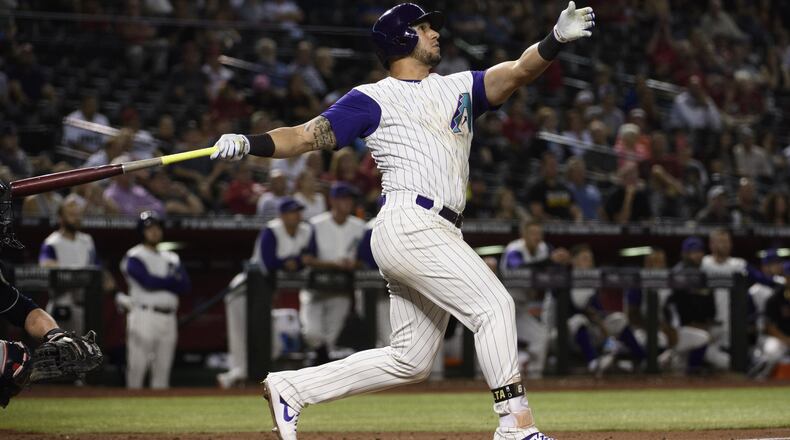They’d played 27 innings in Los Angeles, never leading. In the top of the ninth Thursday in Phoenix, Josh Donaldson put the Braves ahead. When that happens 35-1/2 innings into what always figured to be a difficult trip, there can be no excuses. You must stop the rot. You must win the game.
Luke Jackson, the latest in a line of would-be closers, was one out away. There can be no faulting what Jackson has done this season. He yielded four earned runs March 28 in Philadelphia. He’d yielded nothing since. He’d struck out 19 in 16 innings, walking only six. He hadn’t been touched for a home run in six weeks. He retired the first two Diamondbacks on a three-pitch strikeout and a groundout. The Braves were an out away.
Jackson started David Peralta with a slider. Swing and miss. Two more sliders were balls. Then Jackson threw what Peralta would describe as a hanging slider but which MLB.com would record as an 82-mph curveball. (Meaning: slower than a slider, with a bigger break.) Peralta hit it 432 feet. Tie game. Blown save.
Bullpen. Again.
We stipulate that the bullpen hadn’t been an issue in L.A., a series in which the Braves were simply boat-raced. Kevin Gausman, coming off his ejection-truncated start in Miami, lasted 4-1/3 innings Monday. Max Fried took a line drive off his pitching hand and was gone in the second inning Tuesday. Mike Foltynewicz slogged through six innings Wednesday, again looking nothing like the All-Star Folty of 2018. The Braves were outclassed by the team that outclassed them in the NLDS, and nothing suggested the gap had closed. (On the contrary.)
Thursday in Phoenix offered a chance to get better, if not well. The D-backs dumped Paul Goldschmidt and A.J. Pollock over the winter but have remained buoyant. They swept the Braves in Cobb County in April. They’re not to be confused with the Dodgers, but they’ve done well. They had a tough time against Mike Soroka, which every opponent does, and then their closer, Greg Holland, was bested by Donaldson in the ninth.
On such a night, a struggling club simply cannot lose. The Braves lost, 3-2 in 10 innings. They’re 18-20, four games behind Philadelphia in the East, owners of the National League’s ninth-best record.
The analytics folks insist that closing is overrated, and sometimes it is. How hard is it to “save” a game in which you hold a three-run lead with three outs to go against the Marlins? But these weren’t the Marlins, and the Braves’ margin for error in this ninth inning was one pitch. By throwing an 82-mph curve to a hitter who’d just seen three 88-mph sliders, Jackson accelerated Peralta’s bat. Ergo, a 432-foot home run pulled down the right-field line.
Jackson has been throwing his fastball at 95.9 mph. The slider is the pitch he throws most often (54.8 percent), then the fastball (33.4 percent). He throws his curveball 11.7 percent of the time, which suggests he considers it his third-best pitch. If you follow three sliders with a fastball that Peralta hits over the fence, you do the baseball thing and Tip Your Hat. If you throw your third-best pitch and it gets hit 432 feet, we wonder why a closer went with his third-best pitch.
In Jackson's defense, Peralta's homer was the first hit an opponent had managed off his curve this season. (Opponents hit .391 against it last year.) Maybe we're giving Peralta too little credit: Maybe he guessed right and just hit a good pitch, although it's hard to imagine any universe in which a pitch that arrives above the belt at 82 mph is considered "good." And here we go back to closers, and the identity thereof.
If Craig Kimbrel – just picking a name – gives up a homer with two out in the ninth, you check his track record and say, "That's a rarity." With Arodys Vizcaino lost to shoulder surgery, the Braves have nobody in the organization with a track record of negotiating the ninth inning on a big-league level. A.J. Minter has removed himself from ninth-inning consideration, and he faced three batters in the 10th on Thursday, retiring none. With this loss, his ERA rose to 9.82. Brian Snitker hinted afterward that Minter could be Gwinnett-bound.
Sean Newcomb has had two encouraging outings in relief, but he’s a career starter who has a history of walking people, which is the one thing a closer can’t do. At the moment, Jackson still seems the best in-house option. Trouble is, he picked a bad moment to have his first closing wobble.
Nothing erodes a team’s belief faster than a blown lead. That’s another part of the closing-is-overblown argument that analytics can’t measure. Closing is overblown until your closer blows a game. Then it’s a big deal. If your latest accidental closer blows a lead after three egregious losses in the midst of the season’s longest road trip, it seems even bigger.
Not every game of this season should be considered a referendum on Kimbrel. But when you’re under .500 and you have the third-worst save percentage (53.9) among NL clubs and you’ve just had the rug jerked from beneath you again, it’s hard not to think about the guy who isn’t here.
About the Author
The Latest
Featured



